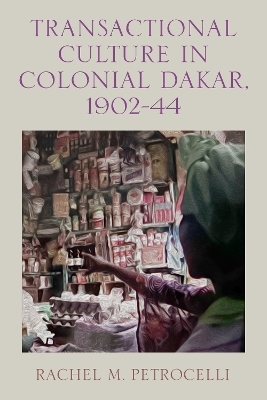
Transactional Culture in Colonial Dakar, 1902-44
Seiten
2024
University of Rochester Press (Verlag)
978-1-64825-077-4 (ISBN)
University of Rochester Press (Verlag)
978-1-64825-077-4 (ISBN)
Examines Dakar's transformation from a small colonial capital to a dynamic city, highlighting how its resourceful residents challenged French control by forging adaptive economic relationships.
During a transformative era in the first half of the twentieth century, Dakar—former capital of French West Africa and present-day capital of Senegal—evolved from a small colonial capital meant to serve the French administration to a dynamic city shaped not solely by colonial planners but also by its resourceful inhabitants. In this important book, historian Rachel Petrocelli introduces the concept of transactional culture, a set of norms and practices forged by Dakar's residents to navigate life under colonial rule. A central element of that culture was transience, a defining feature permeating various facets of life in Dakar, from commerce and employment to housing and interactions with the state.
The book uncovers a central dynamic: economic relationships in Dakar were continually molded by the ebb and flow of diverse individuals, each pursuing their own objectives despite the relentless efforts of the French state to exert control. Both Europeans and Africans embraced adaptability in Dakar over fixed residence, while immigrant communities implanted themselves and became integral to the city's transactional culture. In this examination based on court records and other sources, Petrocelli shows that as the French colonial state sought to shape and control Dakar, it enacted policies to intentionally limit city dwellers' resources. Strategies like pawning possessions and taking out credit, creatively devising housing, and mobilizing identities and affiliations emerged as a result, integrating Dakarois of every background. These practices persisted long after French rule ended, underscoring the enduring impact of Dakar's colonial history.
During a transformative era in the first half of the twentieth century, Dakar—former capital of French West Africa and present-day capital of Senegal—evolved from a small colonial capital meant to serve the French administration to a dynamic city shaped not solely by colonial planners but also by its resourceful inhabitants. In this important book, historian Rachel Petrocelli introduces the concept of transactional culture, a set of norms and practices forged by Dakar's residents to navigate life under colonial rule. A central element of that culture was transience, a defining feature permeating various facets of life in Dakar, from commerce and employment to housing and interactions with the state.
The book uncovers a central dynamic: economic relationships in Dakar were continually molded by the ebb and flow of diverse individuals, each pursuing their own objectives despite the relentless efforts of the French state to exert control. Both Europeans and Africans embraced adaptability in Dakar over fixed residence, while immigrant communities implanted themselves and became integral to the city's transactional culture. In this examination based on court records and other sources, Petrocelli shows that as the French colonial state sought to shape and control Dakar, it enacted policies to intentionally limit city dwellers' resources. Strategies like pawning possessions and taking out credit, creatively devising housing, and mobilizing identities and affiliations emerged as a result, integrating Dakarois of every background. These practices persisted long after French rule ended, underscoring the enduring impact of Dakar's colonial history.
RACHEL M. PETROCELLI is Professor of History at Santiago Canyon College in Southern California.
List of Illustrations
Acknowledgments
Introduction
1. Illusory Roots: Europeans, Autochthony, and Visions of a Capital City
2. The Rhetoric of Refoulement in Colonial Dakar
3. Challenges and Solutions of the Transient City
4. Impediments and Ingenuity in Financial Life
5. Ethnic Boundaries, Economic Niches, and Ambiguities in the Colonial City
6. The Lebanese and the Local in the Interwar Period
7. War's Window: Urban Informality and Control
Epilogue
Bibliography
Index
| Erscheinungsdatum | 23.05.2024 |
|---|---|
| Reihe/Serie | Rochester Studies in African History and the Diaspora |
| Zusatzinfo | 11 b/w illus. |
| Verlagsort | Rochester |
| Sprache | englisch |
| Maße | 152 x 229 mm |
| Gewicht | 1 g |
| Themenwelt | Geschichte ► Allgemeine Geschichte ► Neuzeit (bis 1918) |
| Geisteswissenschaften ► Geschichte ► Regional- / Ländergeschichte | |
| Geschichte ► Teilgebiete der Geschichte ► Wirtschaftsgeschichte | |
| Sozialwissenschaften ► Soziologie | |
| ISBN-10 | 1-64825-077-7 / 1648250777 |
| ISBN-13 | 978-1-64825-077-4 / 9781648250774 |
| Zustand | Neuware |
| Haben Sie eine Frage zum Produkt? |
Mehr entdecken
aus dem Bereich
aus dem Bereich
Europa 1848/49 und der Kampf für eine neue Welt
Buch | Hardcover (2023)
DVA (Verlag)
CHF 67,20
Giordano Bruno - ein ketzerisches Leben
Buch | Hardcover (2024)
C.H.Beck (Verlag)
CHF 41,85


